
Paradise Fossil Plant Crews Help Protect Peregrine Falcons
High above the Tennessee Valley Authority’s Paradise reservation in western Kentucky, a tiny black dot rocketed toward Earth.
It was hard to make out any shape – only that it approached with incredible speed.
As it swooped closer, its silhouette came into sharp focus.
A mighty peregrine falcon.
Capable of dive-bombing at speeds up to 240 mph, falcons strike fear into other birds.
But for TVA’s Demolition crews, these fierce predators have become familiar friends.
Since 2023, protected peregrine falcons have chosen to nest in the former Paradise Fossil Plant near the newer Paradise Combined Cycle Plant.
Because their nest sites sat in active demolition zones, TVA crews coordinated with the Kentucky Department of Fish and Wildlife Resources to protect the falcons during nesting.
TVA Demolition and Transmission teams working at Paradise built a tower with a specialized nesting box perched on top to encourage them to relocate in the future – a project that earned them the Peregrine Falcon Cooperator of the Year award from the Kentucky Department of Fish and Wildlife Resources.
Balancing long-term building plans with the birds’ needs meant communication and compromise.
It’s part of TVA’s mission to care for lands, waters and living things across the Valley region.
“It’s important to be good stewards of the environment and wildlife that can’t necessarily take care of themselves,” said Steve West, senior project manager at Paradise Fossil Plant.
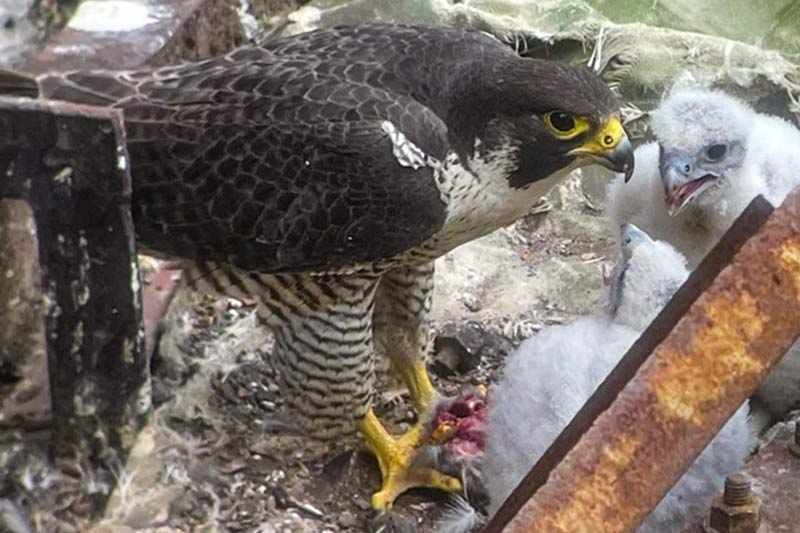
A peregrine falcon feeds chicks on a retired-stack nesting site. TVA crews constructed a new nest box in hopes of creating a safer nesting spot. (Photos provided by Bailey Story / TVA)
Protected Species
Like other birds of prey, the peregrine falcon faced extinction in the 1960s, largely because the pesticide DDT weakened its eggshells.
Populations plummeted to just 324 pairs. None lived in the eastern United States.
The bird was listed under the Endangered Species Act in 1973 and, for decades, scientists across the country raised young birds in captivity.
The peregrine falcon soared off the endangered species list in 1999.
Today, seeing one – let alone having a pair hunt and nest nearby – is a thrill and a great responsibility.
“They are some kind of bird,” Mitch Cundiff, construction manager at Paradise Fossil Plant, said.
“And this particular bird happens to be protected,” said West, referring to the federal Migratory Bird Treaty Act.
Prior to any demolition – or building, remodeling or disturbance – TVA scientists inspect sites for protected species such as bats, birds and snakes.
TVA zoologists Liz Hamrick and Rob Stinson surveyed the site with Cundiff in 2023.
“We were on the top elevation on the steel, up there on the catwalks moving around, when they heard this call,” Cundiff said.
Hamrick played the falcon’s three distinct calls through a speaker.
“At least one of the birds started talking back to her and flying around,” Cundiff said.
With more sleuthing, they found the bird’s eggs 300 feet up.
“They don’t build a nest,” Cundiff said. “This was a little shed that had a metal floor. They just laid their eggs in there.”
The Paradise crew worked closely with the Kentucky Department of Fish and Wildlife Resources biologist to set up a buffer zone and monitor the falcons.
Through spring into summer, while the male and female birds took turns incubating the eggs, the crew watched and waited. Finally, come July, chicks fledged and flew away.
“It delayed us a little bit, but that’s where we learned a lot about falcons,” Cundiff said.
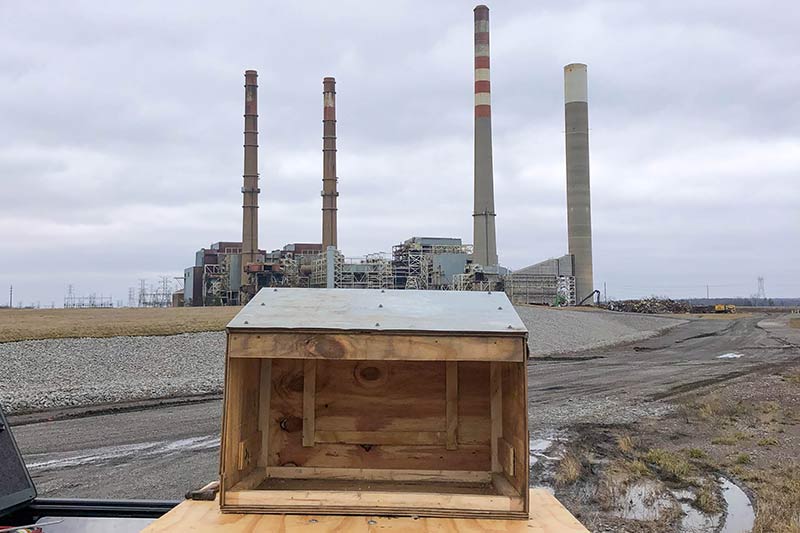
Crews at Paradise Fossil Plant constructed a nesting box in hopes that nesting peregrine falcons would choose it over retired stacks.
If You Build It
Peregrine falcons are the fastest animals on Earth. They eat birds exclusively, and they find fluttering pigeons around utility sites especially tasty.
And, generally, falcons aren’t known to roost any lower than 100 feet off the ground.
As the tallest towers had been demolished at Paradise, crews built a new wood nesting box filled with clean pea gravel.
Using a utility bucket truck, TVA Transmission crews raised the box high into the sky and mounted it on a pole overlooking the Green River.
In spring 2024, the peregrine falcons returned, surveyed the scene and chose not to use the box. Instead, they settled onto another exposed ledge.
“It was only 50 feet off the ground,” West said. “So that’s another thing we’ve learned about peregrine falcons – that nobody told them how they were supposed to act.”
“They ignored their nicely built home, somewhere where they’d be protected from the elements,” Cundiff said, chuckling. “They chose to lay their eggs on that metal edging of a duct. And they had to weather some storms.”
That second year of falcon nesting delayed the demolition of the stack, but Cundiff and West were happy to help.
“We danger-taped the area off, where people just couldn’t go up and disturb the birds,” Cundiff said.
“We set up the binoculars and would peek around the corner to make sure everything was still OK,” West said. “We were able to count eggs.”
“And we kept in touch with the state biologist the whole time,” Cundiff said. “Whatever he told us to do, we would try our best to do it.”
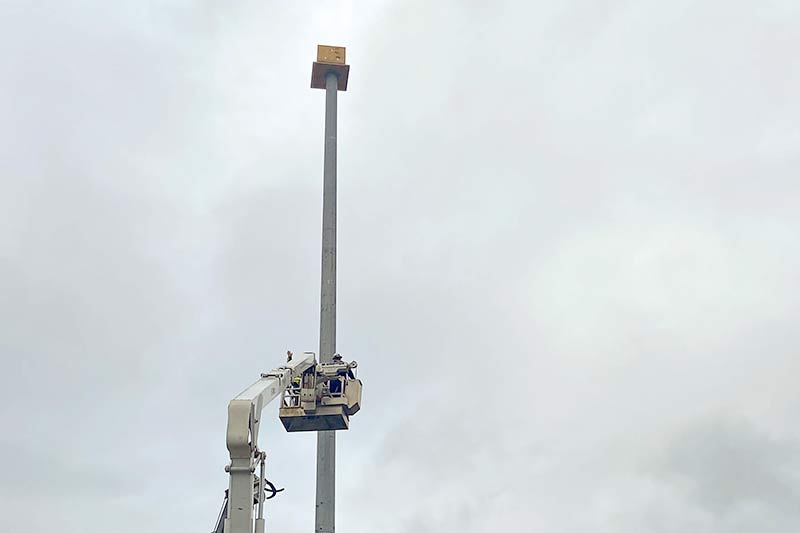
Work crews carefully adjust a pole and nesting box for peregrine falcons.
Conservation Cooperation
Their efforts paid off.
In 2024, the crews at Paradise earned the Peregrine Falcon Cooperator of the Year Award, recognizing the team’s exceptional support.
The falcons returned again in 2025 to lay eggs out of sight in protected ductwork.
Looking into the future, they’ll continue to safely demolish what’s left of the site now that the cooling towers, smokestacks and scrubbers are gone.
In the meantime, they’ll look to the skies and keep peregrine falcons in mind.
“We’re not going to do any more demolition till 2027,” West said. “And if the falcons come back, we’ll just have to wait till they move.
“We’ve got to take care of all that’s out there.”
Photo Gallery
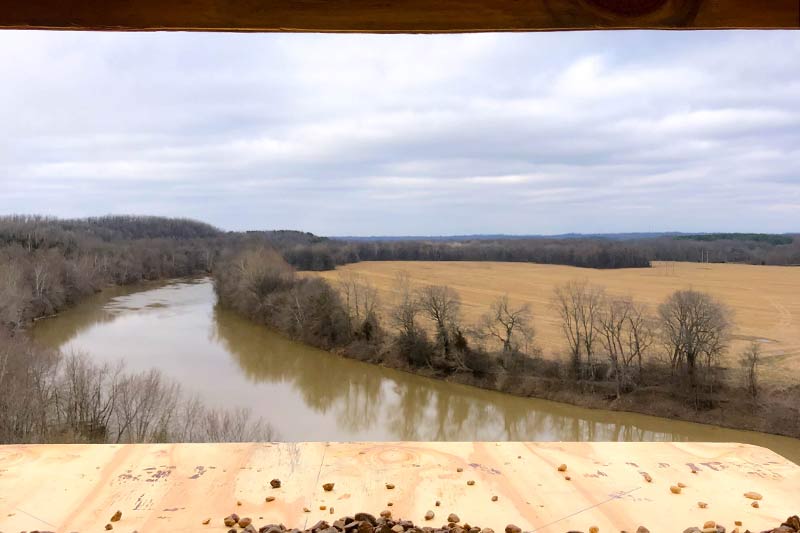
The view from the new peregrine nesting box overlooking the Green River in western Kentucky.
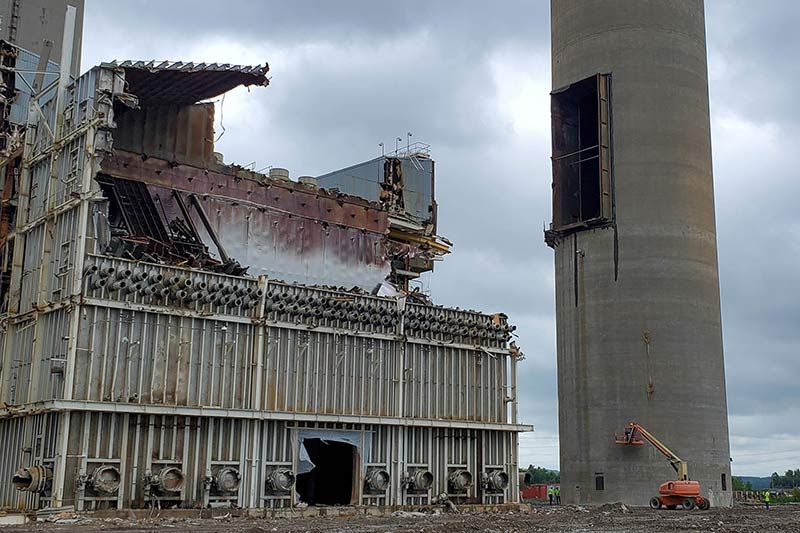
Structures slated for demolition at Paradise Fossil Plant became protected homes for peregrine falcons during nesting season.
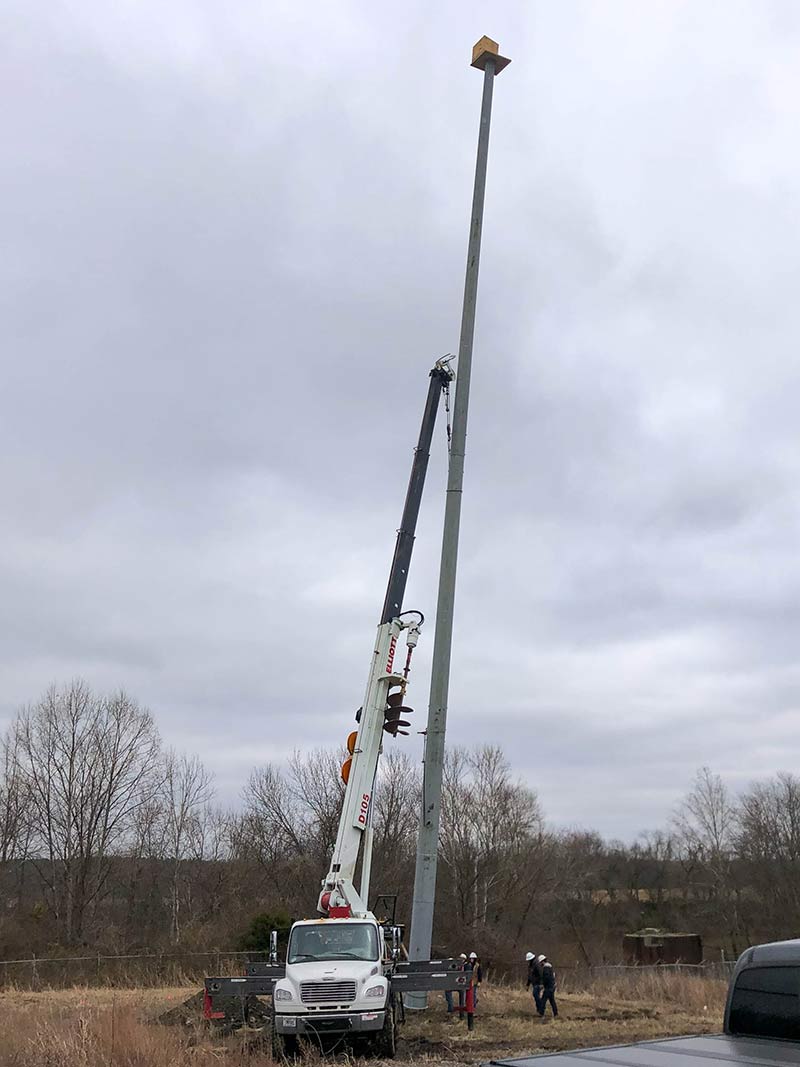
Crews at Paradise erecting a tall pole where a new nesting box would hopefully attract a pair of peregrine falcons.
